Abstract
Sera from 182 newly diagnosed breast cancer patients were assayed for antibodies to p53 using an enzyme-linked immunosorbent assay (ELISA) method, and antibodies were detected in 48 (26%) compared with 1 out of 76 (1.3%) normal control volunteers (P = 0.0001). In breast cancer patients, autoantibodies were found in all stages of disease progression: carcinoma in situ, primary invasive breast cancer and in metastatic disease. In the subset of patients in whom sequential sera were assessed over a 6 month period, changes in the p53 antibody titres were observed. The presence of antibodies to p53 correlated positively with high histological grade (P = 0.0012) and a history of second primary cancer (six positive out of eight cases). The incidence of autoantibodies was lower in those patients with a first-degree relative with breast cancer (P = 0.046). Out of 68 patients, there was a significant correlation between positive p53 autoantibody status and the detection of p53 protein in the tissue sections by immunocytochemistry (P = 0.002). In the seronegative patients, positive p53 tumour staining was strongly associated with a family history of breast cancer (P = 0.009). The p53 protein overexpressed in heritable breast cancers may therefore be less immunogenic. The presence of p53 autoantibodies provides important additional information to immunochemistry and may identify patients with aggressive histological types of breast cancer.
Full text
PDF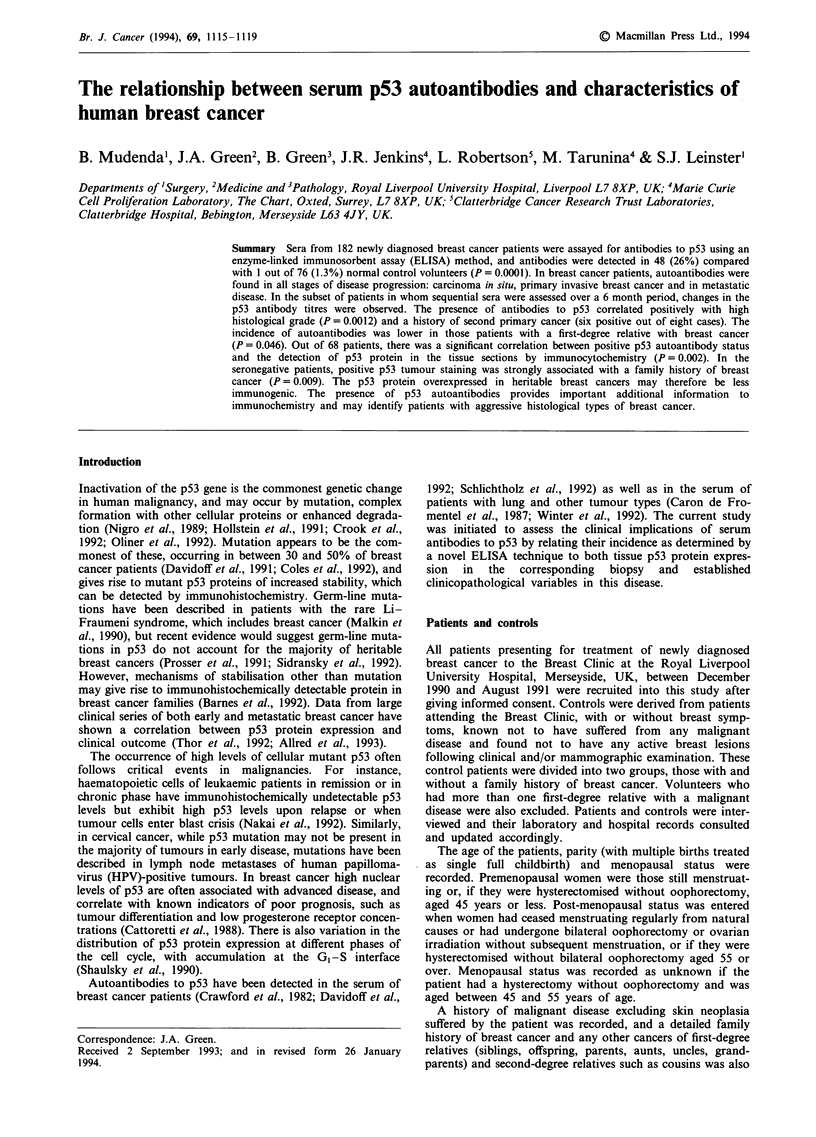
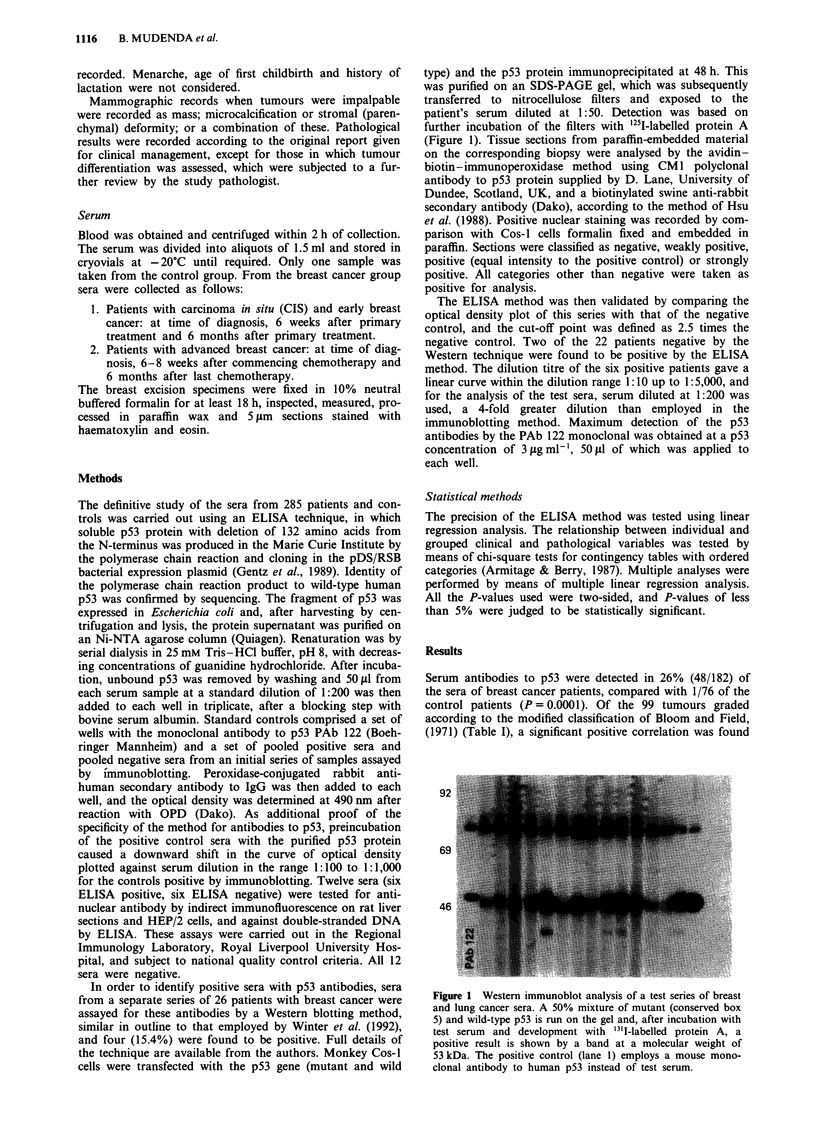
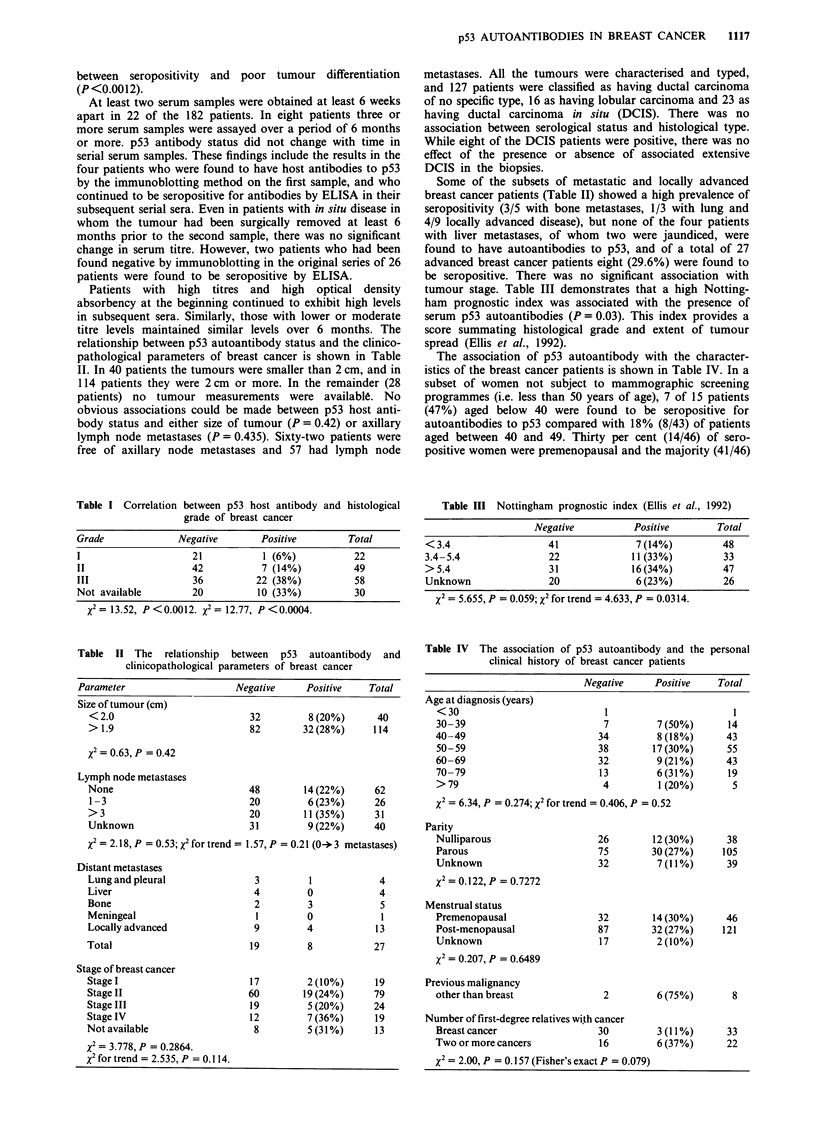
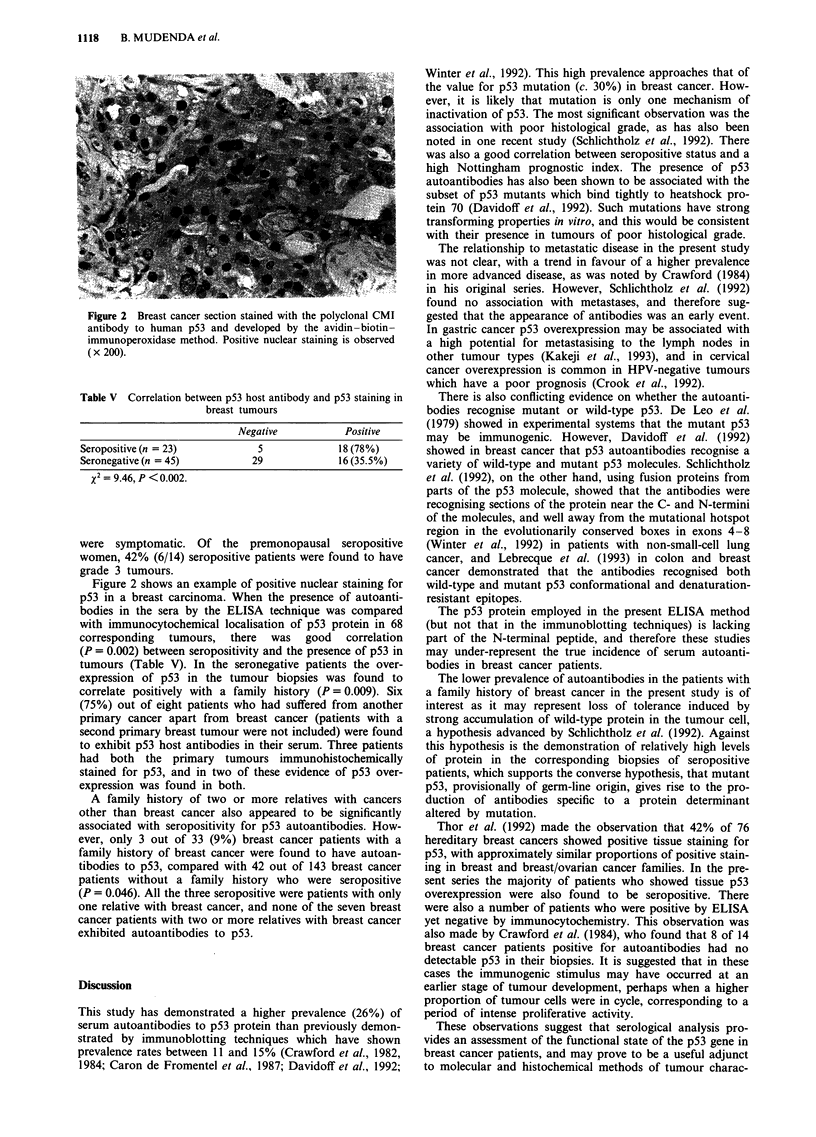
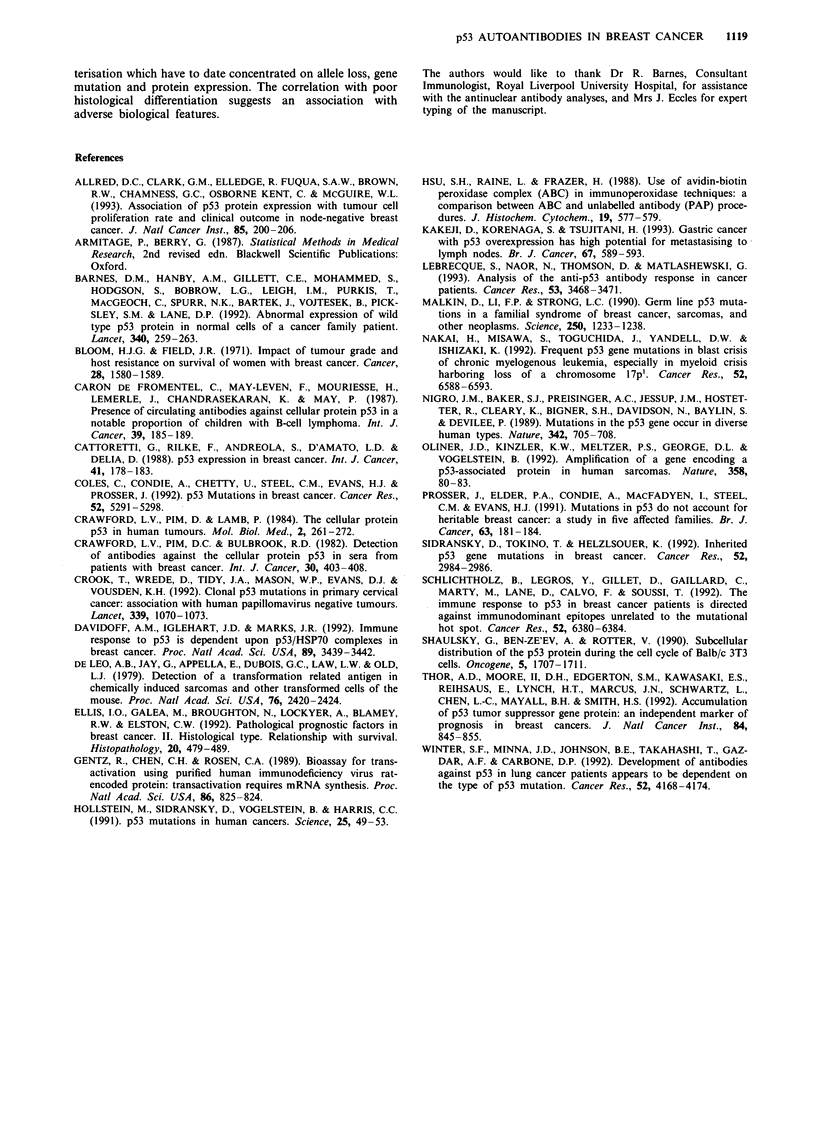
Images in this article
Selected References
These references are in PubMed. This may not be the complete list of references from this article.
- Allred D. C., Clark G. M., Elledge R., Fuqua S. A., Brown R. W., Chamness G. C., Osborne C. K., McGuire W. L. Association of p53 protein expression with tumor cell proliferation rate and clinical outcome in node-negative breast cancer. J Natl Cancer Inst. 1993 Feb 3;85(3):200–206. doi: 10.1093/jnci/85.3.200. [DOI] [PubMed] [Google Scholar]
- Barnes D. M., Hanby A. M., Gillett C. E., Mohammed S., Hodgson S., Bobrow L. G., Leigh I. M., Purkis T., MacGeoch C., Spurr N. K. Abnormal expression of wild type p53 protein in normal cells of a cancer family patient. Lancet. 1992 Aug 1;340(8814):259–263. doi: 10.1016/0140-6736(92)92354-i. [DOI] [PubMed] [Google Scholar]
- Bloom H. J., Field J. R. Impact of tumor grade and host resistance on survival of women with breast cancer. Cancer. 1971 Dec;28(6):1580–1589. doi: 10.1002/1097-0142(197112)28:6<1580::aid-cncr2820280637>3.0.co;2-t. [DOI] [PubMed] [Google Scholar]
- Caron de Fromentel C., May-Levin F., Mouriesse H., Lemerle J., Chandrasekaran K., May P. Presence of circulating antibodies against cellular protein p53 in a notable proportion of children with B-cell lymphoma. Int J Cancer. 1987 Feb 15;39(2):185–189. doi: 10.1002/ijc.2910390211. [DOI] [PubMed] [Google Scholar]
- Cattoretti G., Rilke F., Andreola S., D'Amato L., Delia D. P53 expression in breast cancer. Int J Cancer. 1988 Feb 15;41(2):178–183. doi: 10.1002/ijc.2910410204. [DOI] [PubMed] [Google Scholar]
- Coles C., Condie A., Chetty U., Steel C. M., Evans H. J., Prosser J. p53 mutations in breast cancer. Cancer Res. 1992 Oct 1;52(19):5291–5298. [PubMed] [Google Scholar]
- Crawford L. V., Pim D. C., Bulbrook R. D. Detection of antibodies against the cellular protein p53 in sera from patients with breast cancer. Int J Cancer. 1982 Oct 15;30(4):403–408. doi: 10.1002/ijc.2910300404. [DOI] [PubMed] [Google Scholar]
- Crawford L. V., Pim D. C., Lamb P. The cellular protein p53 in human tumours. Mol Biol Med. 1984 Aug;2(4):261–272. [PubMed] [Google Scholar]
- Crook T., Wrede D., Tidy J. A., Mason W. P., Evans D. J., Vousden K. H. Clonal p53 mutation in primary cervical cancer: association with human-papillomavirus-negative tumours. Lancet. 1992 May 2;339(8801):1070–1073. doi: 10.1016/0140-6736(92)90662-m. [DOI] [PubMed] [Google Scholar]
- Davidoff A. M., Iglehart J. D., Marks J. R. Immune response to p53 is dependent upon p53/HSP70 complexes in breast cancers. Proc Natl Acad Sci U S A. 1992 Apr 15;89(8):3439–3442. doi: 10.1073/pnas.89.8.3439. [DOI] [PMC free article] [PubMed] [Google Scholar]
- DeLeo A. B., Jay G., Appella E., Dubois G. C., Law L. W., Old L. J. Detection of a transformation-related antigen in chemically induced sarcomas and other transformed cells of the mouse. Proc Natl Acad Sci U S A. 1979 May;76(5):2420–2424. doi: 10.1073/pnas.76.5.2420. [DOI] [PMC free article] [PubMed] [Google Scholar]
- Ellis I. O., Galea M., Broughton N., Locker A., Blamey R. W., Elston C. W. Pathological prognostic factors in breast cancer. II. Histological type. Relationship with survival in a large study with long-term follow-up. Histopathology. 1992 Jun;20(6):479–489. doi: 10.1111/j.1365-2559.1992.tb01032.x. [DOI] [PubMed] [Google Scholar]
- Gentz R., Chen C. H., Rosen C. A. Bioassay for trans-activation using purified human immunodeficiency virus tat-encoded protein: trans-activation requires mRNA synthesis. Proc Natl Acad Sci U S A. 1989 Feb;86(3):821–824. doi: 10.1073/pnas.86.3.821. [DOI] [PMC free article] [PubMed] [Google Scholar]
- Hollstein M., Sidransky D., Vogelstein B., Harris C. C. p53 mutations in human cancers. Science. 1991 Jul 5;253(5015):49–53. doi: 10.1126/science.1905840. [DOI] [PubMed] [Google Scholar]
- Kakeji Y., Korenaga D., Tsujitani S., Baba H., Anai H., Maehara Y., Sugimachi K. Gastric cancer with p53 overexpression has high potential for metastasising to lymph nodes. Br J Cancer. 1993 Mar;67(3):589–593. doi: 10.1038/bjc.1993.108. [DOI] [PMC free article] [PubMed] [Google Scholar]
- Labrecque S., Naor N., Thomson D., Matlashewski G. Analysis of the anti-p53 antibody response in cancer patients. Cancer Res. 1993 Aug 1;53(15):3468–3471. [PubMed] [Google Scholar]
- Malkin D., Li F. P., Strong L. C., Fraumeni J. F., Jr, Nelson C. E., Kim D. H., Kassel J., Gryka M. A., Bischoff F. Z., Tainsky M. A. Germ line p53 mutations in a familial syndrome of breast cancer, sarcomas, and other neoplasms. Science. 1990 Nov 30;250(4985):1233–1238. doi: 10.1126/science.1978757. [DOI] [PubMed] [Google Scholar]
- Nakai H., Misawa S., Toguchida J., Yandell D. W., Ishizaki K. Frequent p53 gene mutations in blast crisis of chronic myelogenous leukemia, especially in myeloid crisis harboring loss of a chromosome 17p. Cancer Res. 1992 Dec 1;52(23):6588–6593. [PubMed] [Google Scholar]
- Nigro J. M., Baker S. J., Preisinger A. C., Jessup J. M., Hostetter R., Cleary K., Bigner S. H., Davidson N., Baylin S., Devilee P. Mutations in the p53 gene occur in diverse human tumour types. Nature. 1989 Dec 7;342(6250):705–708. doi: 10.1038/342705a0. [DOI] [PubMed] [Google Scholar]
- Oliner J. D., Kinzler K. W., Meltzer P. S., George D. L., Vogelstein B. Amplification of a gene encoding a p53-associated protein in human sarcomas. Nature. 1992 Jul 2;358(6381):80–83. doi: 10.1038/358080a0. [DOI] [PubMed] [Google Scholar]
- Prosser J., Elder P. A., Condie A., MacFadyen I., Steel C. M., Evans H. J. Mutations in p53 do not account for heritable breast cancer: a study in five affected families. Br J Cancer. 1991 Feb;63(2):181–184. doi: 10.1038/bjc.1991.44. [DOI] [PMC free article] [PubMed] [Google Scholar]
- Schlichtholz B., Legros Y., Gillet D., Gaillard C., Marty M., Lane D., Calvo F., Soussi T. The immune response to p53 in breast cancer patients is directed against immunodominant epitopes unrelated to the mutational hot spot. Cancer Res. 1992 Nov 15;52(22):6380–6384. [PubMed] [Google Scholar]
- Shaulsky G., Ben-Ze'ev A., Rotter V. Subcellular distribution of the p53 protein during the cell cycle of Balb/c 3T3 cells. Oncogene. 1990 Nov;5(11):1707–1711. [PubMed] [Google Scholar]
- Sidransky D., Tokino T., Helzlsouer K., Zehnbauer B., Rausch G., Shelton B., Prestigiacomo L., Vogelstein B., Davidson N. Inherited p53 gene mutations in breast cancer. Cancer Res. 1992 May 15;52(10):2984–2986. [PubMed] [Google Scholar]
- Thor A. D., Moore DH I. I., Edgerton S. M., Kawasaki E. S., Reihsaus E., Lynch H. T., Marcus J. N., Schwartz L., Chen L. C., Mayall B. H. Accumulation of p53 tumor suppressor gene protein: an independent marker of prognosis in breast cancers. J Natl Cancer Inst. 1992 Jun 3;84(11):845–855. doi: 10.1093/jnci/84.11.845. [DOI] [PubMed] [Google Scholar]
- Winter S. F., Minna J. D., Johnson B. E., Takahashi T., Gazdar A. F., Carbone D. P. Development of antibodies against p53 in lung cancer patients appears to be dependent on the type of p53 mutation. Cancer Res. 1992 Aug 1;52(15):4168–4174. [PubMed] [Google Scholar]




